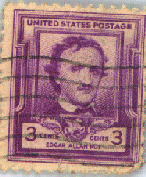How Poe Differed from the Standups
Poe, often depicted as a timid man, did face audiences; but in the reviews of his lectures, humor is not one of the things his auditors noticed. Beauty of expression, the sing-song reading of his voice, the dignity he exuded as a poet: these were his strengths. Unlike the standup comedians, Poe did not use his own faults to evoke humor. Nor did
he react well to others' pointing out what they perceived as his faults either. In 1826 at
Charlottesville when he read a lengthy story he had written to friends, they, according
to Thomas Good Tucker who was there, 'spoke lightly of its merits, and jokingly told him
that his hero's name, "Gaffy" occurred too often.' (Thomas and Jackson
75) after which they began to call him "Gaffy" Poe, a name which stuck. The immediate criticism
caused the young Poe to throw the story immediately into the fire before his friends
could stop him. Tucker remembered that the lost tale "was intensely amusing, entirely
free from his usual sombre coloring and sad conclusions." (Thomas and Jackson 75).
Unlike the standup comedians, Poe did not use his own faults to evoke humor. Nor did
he react well to others' pointing out what they perceived as his faults either. In 1826 at
Charlottesville when he read a lengthy story he had written to friends, they, according
to Thomas Good Tucker who was there, 'spoke lightly of its merits, and jokingly told him
that his hero's name, "Gaffy" occurred too often.' (Thomas and Jackson
75) after which they began to call him "Gaffy" Poe, a name which stuck. The immediate criticism
caused the young Poe to throw the story immediately into the fire before his friends
could stop him. Tucker remembered that the lost tale "was intensely amusing, entirely
free from his usual sombre coloring and sad conclusions." (Thomas and Jackson 75).
In person, then, Poe neither sought to nor was he able to create the atmosphere right for humor. He could not, like the standups, walk into a room and have people rollicking. He could, however, command their attention. He might have been a little Charlie Chaplin man but without the funny walk or the amusing movements.
Because Poe's humor is not self-deprecating, because it is not -- as most standup humor is -- easily accessible, and because it is not underwritten by a man who looks funny, we tend to discount its existence at all. There are, however, three ways to uncovering and understanding Poe's attempts at humor. Now that we have ruled out Poe's possessing the spirit of the standup artist, I would like to call on these to show us that the humor exists, that it pervades Poe's written work throughout his life and that it still has power in modern readings of the works. The examination will have historical, critical and psychological perspectives.
